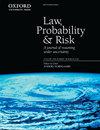Mt. Everest—we are going to lose many: a survey of fingerprint examiners’ attitudes towards probabilistic reporting
IF 1.4
4区 社会学
Q1 LAW
引用次数: 5
Abstract
Over the past decade, with increasing scientific scrutiny on forensic reporting practices, there have been several efforts to introduce statistical thinking and probabilistic reasoning into forensic practice. These efforts have been met with mixed reactions—a common one being scepticism, or downright hostility, towards this objective. For probabilistic reasoning to be adopted in forensic practice, more than statistical knowledge will be necessary. Social scientific knowledge will be critical to effectively understand the sources of concern and barriers to implementation. This study reports the findings of a survey of forensic fingerprint examiners about reporting practices across the discipline and practitioners’ attitudes and characterizations of probabilistic reporting. Overall, despite its adoption by a small number of practitioners, community-wide adoption of probabilistic reporting in the friction ridge discipline faces challenges. We found that almost no respondents currently report probabilistically. Perhaps more surprisingly, most respondents who claimed to report probabilistically, in fact, do not. Furthermore, we found that two-thirds of respondents perceive probabilistic reporting as ‘inappropriate’—their most common concern being that defence attorneys would take advantage of uncertainty or that probabilistic reports would mislead, or be misunderstood by, other criminal justice system actors. If probabilistic reporting is to be adopted, much work is still needed to better educate practitioners on the importance and utility of probabilistic reasoning in order to facilitate a path towards improved reporting practices.珠穆朗玛峰——我们将失去很多:指纹检查者对概率报告态度的调查
在过去的十年里,随着对法医报告实践的科学审查不断增加,已经做出了一些努力,将统计思维和概率推理引入法医实践。这些努力得到了不同的反应——一个常见的反应是对这一目标的怀疑或彻底的敌意。为了在法医实践中采用概率推理,需要的不仅仅是统计知识。社会科学知识对于有效理解关注的根源和实施障碍至关重要。本研究报告了一项对法医指纹检查员的调查结果,该调查涉及整个学科的报告实践以及从业者对概率报告的态度和特征。总体而言,尽管少数从业者采用了概率报告,但在摩擦脊学科中,社区范围内采用概率报告面临挑战。我们发现,目前几乎没有受访者有概率报告。也许更令人惊讶的是,大多数声称有可能报告的受访者实际上并没有。此外,我们发现,三分之二的受访者认为概率报告“不合适”——他们最担心的是辩护律师会利用不确定性,或者概率报告会误导或被其他刑事司法系统行为者误解。如果要采用概率报告,还需要做很多工作来更好地教育从业者概率推理的重要性和实用性,以促进改进报告实践。
本文章由计算机程序翻译,如有差异,请以英文原文为准。
求助全文
约1分钟内获得全文
求助全文
来源期刊

Law Probability & Risk
MATHEMATICSSTATISTICS & PROBABILITY&-STATISTICS & PROBABILITY
CiteScore
2.10
自引率
28.60%
发文量
8
期刊介绍:
Law, Probability & Risk is a fully refereed journal which publishes papers dealing with topics on the interface of law and probabilistic reasoning. These are interpreted broadly to include aspects relevant to the interpretation of scientific evidence, the assessment of uncertainty and the assessment of risk. The readership includes academic lawyers, mathematicians, statisticians and social scientists with interests in quantitative reasoning.
The primary objective of the journal is to cover issues in law, which have a scientific element, with an emphasis on statistical and probabilistic issues and the assessment of risk.
Examples of topics which may be covered include communications law, computers and the law, environmental law, law and medicine, regulatory law for science and technology, identification problems (such as DNA but including other materials), sampling issues (drugs, computer pornography, fraud), offender profiling, credit scoring, risk assessment, the role of statistics and probability in drafting legislation, the assessment of competing theories of evidence (possibly with a view to forming an optimal combination of them). In addition, a whole new area is emerging in the application of computers to medicine and other safety-critical areas. New legislation is required to define the responsibility of computer experts who develop software for tackling these safety-critical problems.
 求助内容:
求助内容: 应助结果提醒方式:
应助结果提醒方式:


